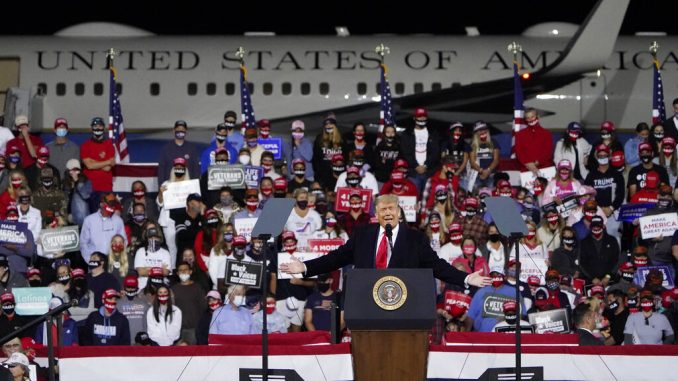
WASHINGTON, D.C. — President Donald Trump on Saturday promised to put forth a female nominee in the coming week to fill the Supreme Court vacancy created by the death of Justice Ruth Bader Ginsburg, pushing the Republican-controlled Senate to consider the pick without delay.
Taking the stage at a North Carolina rally to chants of “Fill that seat,” the president said he would nominate his selection despite Democrats’ objections. And, after conducting what he joked was a “very scientific poll” of the Fayetteville crowd as to whether supporters wanted a man or a woman, he declared the choice would be “a very talented, very brilliant woman.”
He added that he did not yet know whom he would choose.
“We win an election and those are the consequences,” said the president, who then seemed to signal that he’d be willing to accept a vote on his nominee during the lame duck period after the election. “We have a lot of time. We have plenty of time. We’re talking about January 20th.”
The impending clash over the vacant seat — when to fill it and with whom — scrambles the stretch run of a presidential race.
McConnell pledged to Trump to bring the choice to a vote though he has not said if it would be before the election. Democratic presidential nominee Joe Biden said any selection should come after Nov. 3. “Voters should pick the president and the president should pick the justice to consider,” he said.
The president this month added 20 more names to his roster of potential court nominees, and aides in recent days have focused on a short list heavy on female candidates, according to four White House aides and officials close to the process. They spoke on condition of anonymity because they were not authorized to publicly discuss private conversations.
Those under close consideration for the high court include three women who are federal appeals court judges: Amy Coney Barrett, beloved among conservatives and an early favorite; Barbara Lagoa, who is Hispanic and comes from the battleground state of Florida; and North Carolina native Allison Jones Rushing, who clerked for Justice Clarence Thomas and for Neil Gorsuch, when the current Trump-appointed justice was an appeals court judge.
McConnell, who sets the calendar in the Senate and has made judicial appointments his priority, declared unequivocally in a statement that Trump’s nominee would receive a confirmation vote. In 2016, McConnell refused to consider President Barack Obama’s nominee months before the election, eventually preventing a vote on Judge Merrick Garland.
Schumer warned that if Republicans push through the nominee, “nothing is off the table” for Senate rules changes to come, the person said.
Ginsburg’s death seemed certain to stoke enthusiasm in both political parties as the election could now be viewed as referendum on the high court’s decisions, including the future of abortion rights. Democrats raised more than $71 million in the hours after Ginsburg’s death, indicating her passing has already galvanized the party’s base.
A confirmation vote in the Senate is not guaranteed, even with a Republican majority.
McConnell has launched a risky, unprecedented strategy. It could motivate conservative voters to rally behind Trump and GOP senators or it could push away moderates who prefer to see the Senate stick to norms or are fearful of a right-leaning court stripping away women’s right to choose an abortion.
McConnell did not specify the timing. But trying for confirmation in a lame-duck session after the Nov. 3 election, if Trump had lost to Biden or Republicans had lost the Senate, would carry further political complications.
The average number of days to confirm a justice, according to the Congressional Research Service, is 69, which would be after the election. But some Republicans quickly noted that Ginsburg was confirmed in just 42 days.
John Fischetti, who waited in line more than two hours to enter Trump’s Fayetteville rally, said replacing Ginsburg would inflame tensions but was within the president’s rights.
“I would assume it would make everyone more energized,” Fischetti said of the political repercussions. “Trump’s people want him to always press forward.”
Four GOP defections could defeat a nomination, while a tie vote could be broken by Vice President Mike Pence.
The next pick could shape important decisions beyond abortion rights, including any legal challenges that may stem from the 2020 election. In the interim, if the court were to take cases with eight justices, 4-4 ties would revert the decision to a lower court; for instance, the Affordable Care Act could then be struck down by a lower Texas court.
Biden has promised to nominate a black woman to the high court if given the chance. His campaign reiterated it would not release names before the election.


